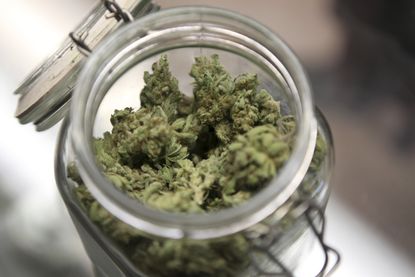Here's the nightmare scenario for pot legalization
Pot should be legal. But let's not be boneheaded about it.


Mark my words: Pot will be legal.
Mark my words: We're going to be completely boneheaded about it.
I think the first proposition is, at this point, uncontroversial. The progress of the cause of pot legalization in the polls is striking. More states are considering some form of it. And there is indeed a lot to be said for the idea: Pot doesn't seem obviously worse than liquor, and the drug war, which has destroyed countless lives over non-violent crimes, does seem excessive. Plus, it's corrosive to the rule of law when something widely practiced, including by future presidents, is formally illegal.
Subscribe to The Week
Escape your echo chamber. Get the facts behind the news, plus analysis from multiple perspectives.

Sign up for The Week's Free Newsletters
From our morning news briefing to a weekly Good News Newsletter, get the best of The Week delivered directly to your inbox.
From our morning news briefing to a weekly Good News Newsletter, get the best of The Week delivered directly to your inbox.
The second proposition is not at the forefront of people's minds, but it's actually very important. And, obviously, our public policy process is not exactly known for competence, so we should be worried.
Pot might not be as harmful as crack cocaine, or the bubonic plague, but it is not completely harmless. Yes, pot is not as dangerous as 1980s PSAs would have had you believe, and yes, the "gateway drug" notion is probably false. But while most pot users remain casual smokers and aren't harmed by it, a small minority of users really do become addicted, and really do damage their bodies and their brains for the long term. We all know That Guy.
I've spent a long time thinking about "vices" in the broad sense, and I've reached the conclusion that, in general, the least-bad way to deal with them is to find a middle ground between total prohibition and total license.
Prostitution, for example, is a case in point. Total prohibition forces the practice underground and makes sex workers, whom society should help, into victims of pimps and, all too often, corrupt police. But, by contrast, jurisdictions that have moved to formal licensing as a harm reduction measure have grown to regret it. In the Netherlands, it was thought that licenses would put a stop to human trafficking as the business got regulated and cleaned up; instead, it seems that legalization only increased demand to an extent that could not be filled voluntarily and human trafficking only ended up increasing. Better, then, it seems, to have a settlement like Sweden's, where selling sex acts is legal, but buying them isn't, or pre-war France, which discouraged prostitution in many ways but still had a number of regulated brothels.
Another good example is gambling. Make gambling totally illegal, and you're basically conjuring profitable organized crime out of thin air. But, at the same time, as my colleague Michael Brendan Dougherty has noted, the steady increase of casino licenses over the United States has had terrifying consequences for the communities involved. Casinos don't depend on casual gamblers, they depend on gambling addicts whose lives, and the lives of those around them, all too often end up destroyed. And it's not the craps tables anymore — the gambling industry has harnessed data science to produce gambling machines that can easily turn people into addicts. Probably better, then, to have Vegas, and Atlantic City, and not much else.
Gambling, or alcohol, is a good analog for pot, in the sense that while most people can partake in a little bit as harmless fun, it does end up destroying, or at least warping, the lives of a minority of users. It's also true that profit-maximizing company might have more of an interest in developing products and marketing strategies to create profitable addicts than to market to broad, but shallow and fickle, popular demand.
This is why Mark Kleiman, a UCLA professor of public policy who has probably thought more about these problems than anyone alive, favors legalizing pot, yes, but also limiting the size of the pot businesses that can be built. Who knows what strains of cannabis might be developed by product designers, scientists, and marketers once the industry is out of the shadows? It would be much too profitable for a, say, Budweiser of pot, to create a product that, for a small but significant minority of users, is something on the order of demonic. And as with, say, tobacco, it would be decades and countless lives destroyed before we realized our mistake and further decades of battles in the public square against rich, entrenched interests, until we can do something about it.
So the best scenario is one where pot is legal, but not Big Pot, where we only get small cooperatives of growers and shops.
Which is why it'll probably never happen! A ballot initiative this week in Ohio that would have granted a big corporation a monopoly on pot in the state was defeated, but there will be more such moves. Silicon Valley venture capitalists and other deep-pocketed investors have invested in the nascent legal pot industry, and want to see their investment spark big returns. Pretty soon you will have well-dressed, well-coiffed young people sitting in front of a House committee talking about how their industry is responsible and wants to be regulated (that is to say, it wants protection against new entrants). Like the spread of legal casino gambling, the dominoes will not fall all at once, but bit by bit, one corrupt or feckless state legislature and one bought ballot initiative after another.
Now, at the end of the day, it really is true that the drug war has caused a lot of unnecessary harm, and it's time for a change. But we should end it without dishing out more pain.
Sign up for Today's Best Articles in your inbox
A free daily email with the biggest news stories of the day – and the best features from TheWeek.com
Pascal-Emmanuel Gobry is a writer and fellow at the Ethics and Public Policy Center. His writing has appeared at Forbes, The Atlantic, First Things, Commentary Magazine, The Daily Beast, The Federalist, Quartz, and other places. He lives in Paris with his beloved wife and daughter.

